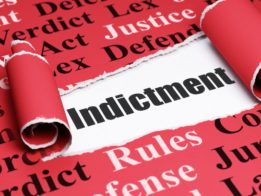
A York County judge has ruled that 904 indictments handed up by the grand jury in June were invalid due to the “unnecessary and … unreasonable burden” undertaken by jurors to consider the cases in a single day.
Criminal defense lawyer Gary C. Lemel of McKinney, Tucker & Lemel, LLC, in Rock Hill served as a lead attorney in the effort to have the indictments quashed.
Lemel and more than two dozen other lawyers argued that the number of indictments processed indicated that, over a period of 10 hours, the grand jury spent an average of 39 seconds on each case.
On August 17, Circuit Court Judge Dan Hall wrote in his opinion that, “Public confidence in our system of justice is eroded by the grand jury being asked to act on 904 indictments in a 10-hour period.”
The judge’s order does not dismiss charges against the defendants, which were made when they were arrested. Hall did not order that a new grand jury be seated, as defense lawyers asked.
What Does a South Carolina Grand Jury Do?
A grand jury serves as the principal body that decides whether a person gets charged with a serious crime (a felony offense) that will be tried in court.
Prosecutors present evidence to members of the grand jury. At least 12 members must agree that probable cause to indict exists. To indict, the grand jury must determine:
- Did a wrongful act occur?
- If so, is it more probable than not that the accused committed the wrongful act?
The grand jury may return a “true bill” of indictment. This is a formal charge or accusation of a serious crime. After an indictment is returned, or “handed up” to the prosecution and the court system, the court will schedule a trial if prosecutors choose to move forward. It is very unusual, but prosecutors may choose not to proceed to trial, even after an indictment has been returned.
A grand jury may also return a “no bill,” or decline to indict, which stops the case from moving forward. However, if a grand jury declines to indict, the prosecutor can present additional evidence to the same grand jury, seat a new grand jury and present to it, or even proceed to file criminal charges without an indictment.
However, it is extremely rare for a grand jury to decline to indict.
The grand jury only decides whether the accused should stand trial based on the evidence before it. The grand jury does not try cases.
In South Carolina, a grand jury is composed of 18 people, although typically only 12 of them serve at any given time. Grand jurors serve for 12-18 months and convene in secret for one to three days each month during the term of service. In York County, the grand jury meets at the Moss Justice Center in York.
Can a Grand Jury Review 900 Cases in a Day?
A team of 27 South Carolina defense lawyers filed motions August 6 to quash all June indictments from the York County grand jury, discharge that grand jury, and have a new grand jury picked.
The Rock Hill Herald reported that the 904 indictments handed up in June were twice as many as in any prior month in 2018 and three times as many as in some months.
Defense lawyers wrote that the grand jury is not supposed to “rubber stamp” cases, and the “high volume” of June cases made the grand jury “unable to fully consider all the evidence.”
“Those indicted have a Constitutional right to have their cases fairly considered,” the defense team said.
Kevin Brackett, 16th Circuit solicitor (a prosecutor), said in a written statement after the order was issued to quash the indictments that his office argued the indictments were lawful and the office did not force the grand jury to hear all 904 cases in June, the Herald said.
The June grand jury was given the option of all hearing cases before it or carrying over cases it could not handle until the next month, Brackett said.
During the August 10 hearing, Brackett told Judge Hall that 904 cases were brought before the June grand jury because his office is “required to indict cases in a timely fashion.”
Prosecutors also argued that the 39-second-per-case average review time was not valid because many cases involved multiple defendants and multiple charges. More than 400 people were charged in the 904 cases.
However, Hall’s order said the community must have confidence that the rights of defendants are being upheld and a grand jury has the opportunity to properly review cases.
Defense attorneys’ spokesman Lemel said in a statement the judge’s ruling ensures people accused of crimes will have their rights upheld.
“We are pleased with the quashing of the indictments and the court’s reminder that the prosecution is only one part of the mechanism of the court system,” Lemel said. “That part cannot burden the other parts, especially while denying rights to defendants.”